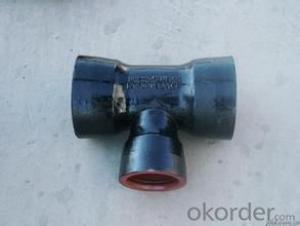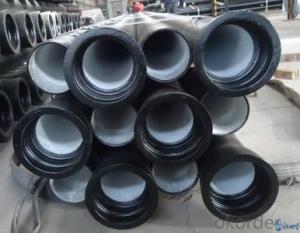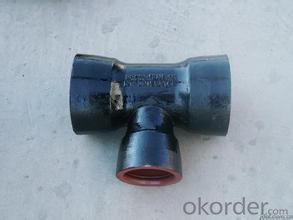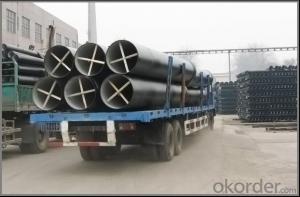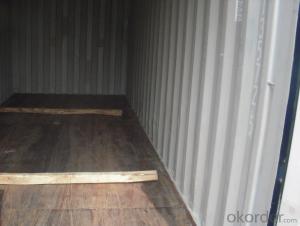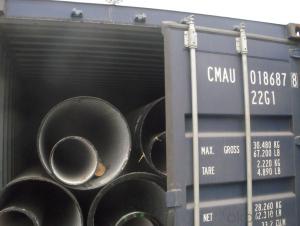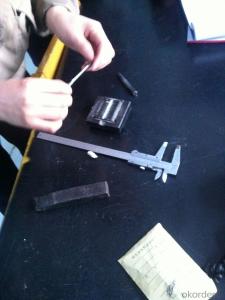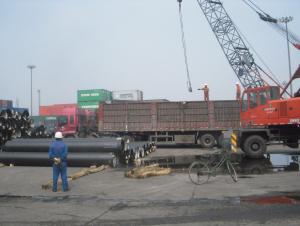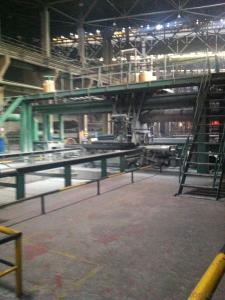DUCTILE IRON PIPE AND PIPE FITTINGS K8 CLASS DN350
- Loading Port:
- Tianjin
- Payment Terms:
- TT OR LC
- Min Order Qty:
- 23 pc
- Supply Capability:
- 3000 pc/month
OKorder Service Pledge
OKorder Financial Service
You Might Also Like
Material : Ductile Cast Iron
Size Range : DN 80mm to DN 2000mm
Unit Effective Length : 6m or 5.7m
Manufacture Standard: ISO 2531:1998/ EN 545:2006/EN 598:2007
Annual capacity : 200,000 tons
Coating Exterior: Zinc 130g/m2 according to ISO 8179-1 and bitumen coating 70 microns.
Cement Interior: Portland Cement/ High Alumina Cement/ Sulphate Resisting Cement Lining according to ISO 4179
Special requirements on external coating and internal lining can be applied
We also provide accessories such as SBR/EPDM rubber gaskets, lubricant paste, pipe caps, PE sleeves, etc.
Additional Parts:
Each pipe is strictly inspected according to related standard to ensure permanently high performance.
Easy Installation at site and service free for life
Long Service Lifespan
Quotation will arrive you within 24hours once we get your inquiry.
We guarantee offering you a competitive price.
A copy of original inspection reports of pipes will be offered after shipment.
Photos of loading process will be sent to the customer after shipment effect.
We will follow-up the delivery progress after shipment effect and update to the customer on weekly basis.
- Q: Can ductile iron pipes be used for underground hydrocarbon pipelines?
- Yes, ductile iron pipes can be used for underground hydrocarbon pipelines. Ductile iron is a strong and durable material that is commonly used in various applications including water and sewage systems, gas pipelines, and even hydrocarbon pipelines. Ductile iron pipes have excellent corrosion resistance properties and can withstand high pressures, making them suitable for transporting hydrocarbons underground. However, it is important to consider factors such as the specific composition of the hydrocarbons being transported and the environmental conditions of the pipeline route to ensure proper material selection and corrosion protection measures are implemented.
- Q: Are ductile iron pipes suitable for mining applications?
- Ductile iron pipes are indeed suitable for mining applications. This type of cast iron has undergone treatment to enhance its strength, durability, and ductility. Notably, these pipes possess high tensile strength and corrosion resistance, making them an ideal choice for underground mining operations that face harsh conditions. The ability of ductile iron pipes to withstand high pressure and heavy loads is one of their key advantages in mining applications. They exhibit excellent structural integrity and can withstand both internal and external forces, ensuring reliable performance in demanding mining environments. Moreover, ductile iron pipes have a long service life and require minimal maintenance. They offer exceptional resistance to abrasion, which is extremely important in mining operations where abrasive materials such as rocks, minerals, and ores are prevalent. Additionally, the smooth inner surface of these pipes minimizes friction, allowing for efficient transportation of mining materials. Furthermore, ductile iron pipes are a cost-effective option compared to alternatives like steel or concrete. They have a lower upfront cost and require less frequent replacements, resulting in reduced long-term expenses for mining companies. In conclusion, ductile iron pipes are highly suitable for mining applications due to their strength, durability, resistance to corrosion and abrasion, long service life, and cost-effectiveness. These pipes ensure reliable and efficient transportation of mining materials, thereby contributing to the overall efficiency and productivity of mining operations.
- Q: Are ductile iron pipes suitable for pressure reducing valve stations?
- Ductile iron pipes prove to be suitable for pressure reducing valve stations due to their strength and durability, making them an ideal choice for applications involving high pressure. Pressure reducing valve stations, which regulate and decrease the pressure of a fluid or gas in a pipeline system, can rely on ductile iron pipes to handle the exerted pressure, ensuring an efficient and reliable operation. Moreover, the excellent resistance to corrosion exhibited by ductile iron pipes is crucial in upholding the integrity of the pipeline system, thereby preventing leaks or failures. Overall, the necessary strength, durability, and corrosion resistance required for pressure reducing valve stations are provided by ductile iron pipes.
- Q: Is it better to use steel tubes or ductile iron pipes for water supply?
- You need a definite environment to say which kind of pipe is good!1, ductile iron pipe is cheap, corrosion resistance, lack of toughness is poor, not easy to process;
- Q: What are the advantages of using ductile iron pipes?
- Using ductile iron pipes in various applications offers several advantages. To begin with, ductile iron pipes possess a high strength-to-weight ratio, making them a cost-effective option for transporting fluids or gases. They can endure high internal and external pressures, ensuring the dependable and efficient transportation of materials. Furthermore, ductile iron pipes exhibit exceptional corrosion resistance. They are impervious to rust and other forms of corrosion, expanding their lifespan and reducing maintenance expenses. This makes them suitable for underground and underwater applications where corrosive elements are present. Moreover, ductile iron pipes demonstrate superior ductility, enabling them to withstand heavy external loads and impacts without cracking or breaking. This renders them less vulnerable to damage during installation or exposure to harsh environmental conditions. In addition, ductile iron pipes possess excellent flow characteristics. Their smooth inner surface minimizes friction and pressure losses, resulting in efficient fluid flow and reduced pumping costs. This is particularly advantageous in applications requiring high flow rates or long-distance transportation. Additionally, ductile iron pipes are environmentally friendly. They are produced from recycled materials and can be recycled themselves, reducing the demand for raw materials and minimizing environmental impact. Furthermore, their prolonged service life diminishes the need for frequent replacements, further reducing waste generation. Lastly, ductile iron pipes offer versatile installation options. They can be installed using various techniques like trenchless methods, which minimize disruption to the surrounding environment and lower installation costs. Their adaptability and ease of installation make them a preferred choice for various construction projects. Overall, the benefits of utilizing ductile iron pipes encompass their high strength, corrosion resistance, ductility, flow characteristics, environmental friendliness, and versatile installation options. These factors establish them as a reliable and cost-effective choice for numerous applications in various industries.
- Q: What are the typical lengths of ductile iron pipes?
- The typical lengths of ductile iron pipes range from 18 feet to 20 feet, although shorter lengths such as 10 feet or longer lengths such as 40 feet can also be found depending on specific project requirements.
- Q: What is ductile iron pipe?
- The main components of ductile iron pipes are carbon, silicon, manganese, sulfur, phosphorus and magnesium. Execution standard GB/T13295-2003ISO2531/2003
- Q: Can ductile iron pipes be used for underground drainage systems?
- Indeed, underground drainage systems can utilize ductile iron pipes. Ductile iron, being a robust and enduring substance, exhibits resistance to corrosion, rendering it appropriate for subterranean applications. Possessing remarkable tensile strength, it can endure substantial loads and pressures, thereby making it an excellent choice for drainage systems that encounter significant flow rates or necessitate substantial burial depths. Moreover, ductile iron pipes boast an extended lifespan, thereby decreasing the requirement for frequent maintenance or replacement. All in all, ductile iron pipes prove to be an unwavering and efficient option for underground drainage systems.
- Q: Are there any special coatings or linings available for ductile iron pipe?
- Yes, there are special coatings and linings available for ductile iron pipe. These coatings and linings are applied to the internal and/or external surfaces of the pipe to provide protection against corrosion and extend the lifespan of the pipe. Some common coatings and linings used for ductile iron pipe include cement mortar lining, polyethylene encasement, epoxy coating, and polyurethane lining. These coatings and linings are designed to prevent the pipe from corroding when in contact with various substances such as water, chemicals, and soil. The specific coating or lining used depends on the application and the environment in which the pipe will be installed.
- Q: Are ductile iron pipes suitable for use in seismic areas?
- Yes, ductile iron pipes are suitable for use in seismic areas. Ductile iron has high strength and flexibility, making it resistant to seismic forces. It is able to withstand ground movements and vibrations during earthquakes without significant damage, making it a reliable choice for water and wastewater infrastructure in seismic areas.
Send your message to us
DUCTILE IRON PIPE AND PIPE FITTINGS K8 CLASS DN350
- Loading Port:
- Tianjin
- Payment Terms:
- TT OR LC
- Min Order Qty:
- 23 pc
- Supply Capability:
- 3000 pc/month
OKorder Service Pledge
OKorder Financial Service
Similar products
Hot products
Hot Searches
Related keywords
